Evaluating Realism and Idealism in International Politics
VerifiedAdded on 2021/04/19
|8
|2139
|95
Essay
AI Summary
This essay provides a comprehensive overview of Realism and Idealism, two fundamental theories in the field of International Relations (IR). It begins by defining IR and highlighting the importance of these theories in understanding the relationships between states, intergovernmental organizations, and other actors in the global arena. The essay then delves into the core tenets of Realism, emphasizing its focus on state power, self-interest, and the prioritization of national security, often at the expense of cultural or moral considerations. Examples such as the relationship between China and Taiwan are used to illustrate realist principles. The essay contrasts Realism with Idealism, which promotes a more cooperative and peaceful world order. It highlights Idealism's emphasis on international institutions and the innate goodness of humanity, using the European Union as an example of idealistic principles in action. The essay further explores the application of both theories in IR, demonstrating how elements of each are relevant in the current international political system, and analyzes whether the two theories are mutually exclusive or overlapping. Finally, the essay examines how states may behave in either a realist or idealist manner, using the examples of the United States, China, and the EU to illustrate this point. The essay concludes by highlighting the dynamic interplay between these two influential theories in shaping global politics.
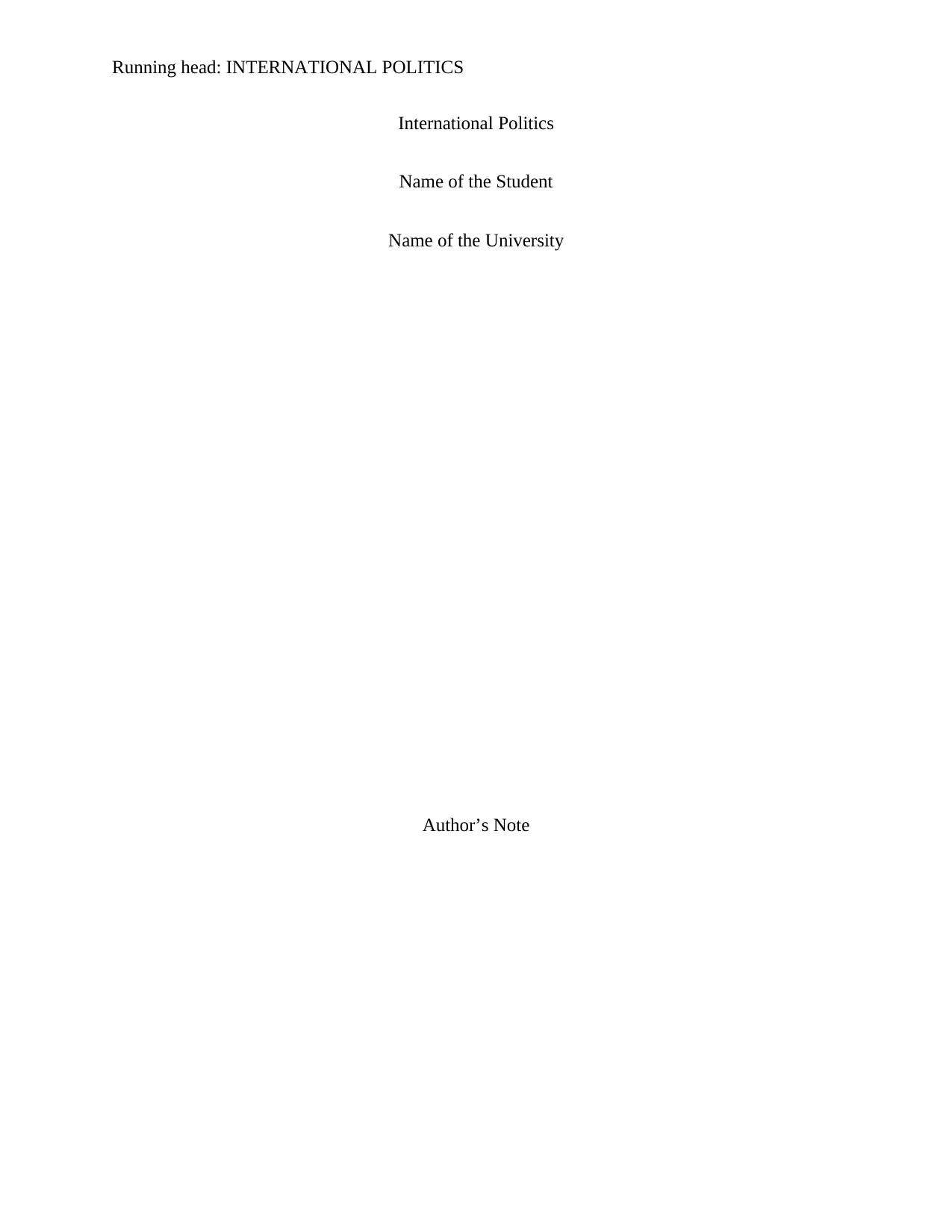
Running head: INTERNATIONAL POLITICS
International Politics
Name of the Student
Name of the University
Author’s Note
International Politics
Name of the Student
Name of the University
Author’s Note
Paraphrase This Document
Need a fresh take? Get an instant paraphrase of this document with our AI Paraphraser
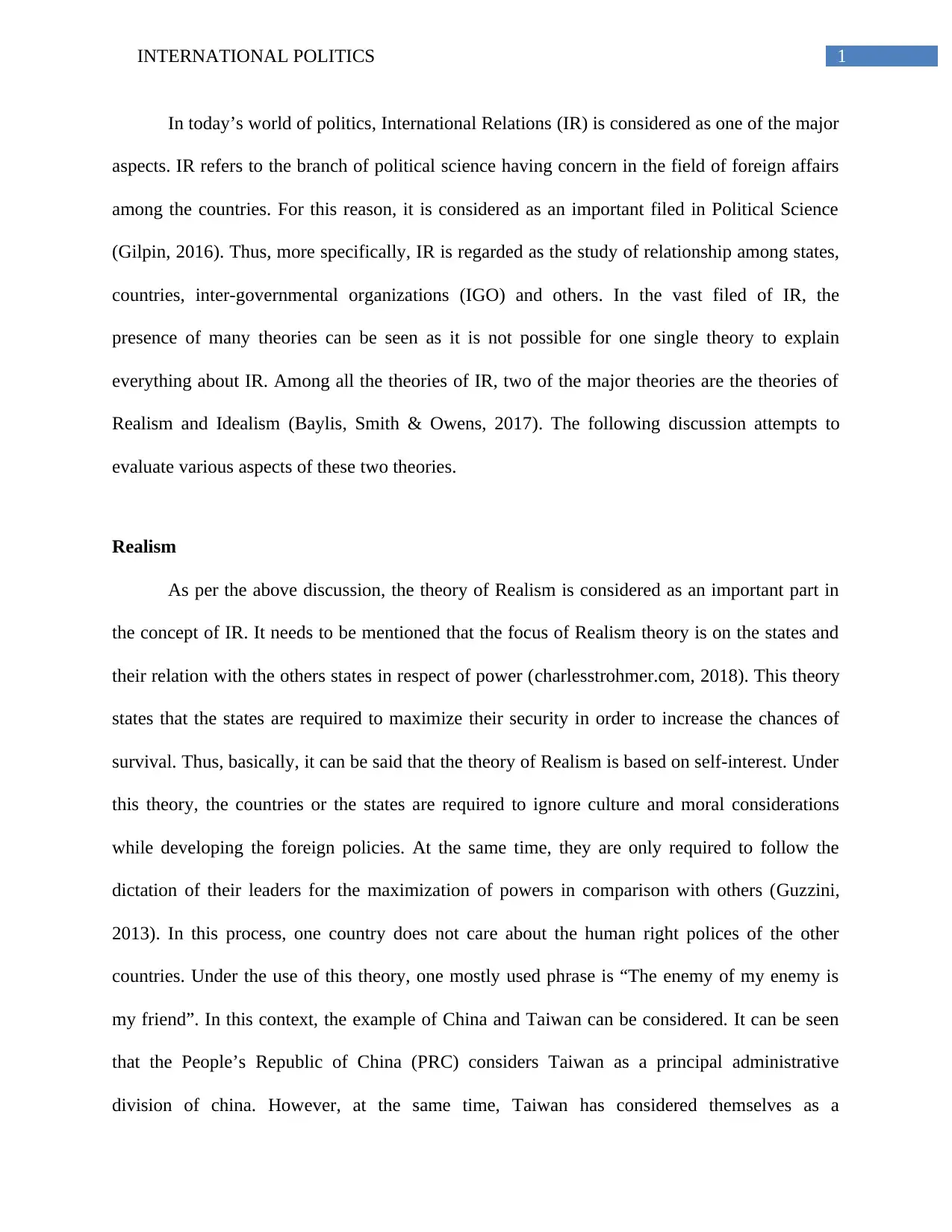
1INTERNATIONAL POLITICS
In today’s world of politics, International Relations (IR) is considered as one of the major
aspects. IR refers to the branch of political science having concern in the field of foreign affairs
among the countries. For this reason, it is considered as an important filed in Political Science
(Gilpin, 2016). Thus, more specifically, IR is regarded as the study of relationship among states,
countries, inter-governmental organizations (IGO) and others. In the vast filed of IR, the
presence of many theories can be seen as it is not possible for one single theory to explain
everything about IR. Among all the theories of IR, two of the major theories are the theories of
Realism and Idealism (Baylis, Smith & Owens, 2017). The following discussion attempts to
evaluate various aspects of these two theories.
Realism
As per the above discussion, the theory of Realism is considered as an important part in
the concept of IR. It needs to be mentioned that the focus of Realism theory is on the states and
their relation with the others states in respect of power (charlesstrohmer.com, 2018). This theory
states that the states are required to maximize their security in order to increase the chances of
survival. Thus, basically, it can be said that the theory of Realism is based on self-interest. Under
this theory, the countries or the states are required to ignore culture and moral considerations
while developing the foreign policies. At the same time, they are only required to follow the
dictation of their leaders for the maximization of powers in comparison with others (Guzzini,
2013). In this process, one country does not care about the human right polices of the other
countries. Under the use of this theory, one mostly used phrase is “The enemy of my enemy is
my friend”. In this context, the example of China and Taiwan can be considered. It can be seen
that the People’s Republic of China (PRC) considers Taiwan as a principal administrative
division of china. However, at the same time, Taiwan has considered themselves as a
In today’s world of politics, International Relations (IR) is considered as one of the major
aspects. IR refers to the branch of political science having concern in the field of foreign affairs
among the countries. For this reason, it is considered as an important filed in Political Science
(Gilpin, 2016). Thus, more specifically, IR is regarded as the study of relationship among states,
countries, inter-governmental organizations (IGO) and others. In the vast filed of IR, the
presence of many theories can be seen as it is not possible for one single theory to explain
everything about IR. Among all the theories of IR, two of the major theories are the theories of
Realism and Idealism (Baylis, Smith & Owens, 2017). The following discussion attempts to
evaluate various aspects of these two theories.
Realism
As per the above discussion, the theory of Realism is considered as an important part in
the concept of IR. It needs to be mentioned that the focus of Realism theory is on the states and
their relation with the others states in respect of power (charlesstrohmer.com, 2018). This theory
states that the states are required to maximize their security in order to increase the chances of
survival. Thus, basically, it can be said that the theory of Realism is based on self-interest. Under
this theory, the countries or the states are required to ignore culture and moral considerations
while developing the foreign policies. At the same time, they are only required to follow the
dictation of their leaders for the maximization of powers in comparison with others (Guzzini,
2013). In this process, one country does not care about the human right polices of the other
countries. Under the use of this theory, one mostly used phrase is “The enemy of my enemy is
my friend”. In this context, the example of China and Taiwan can be considered. It can be seen
that the People’s Republic of China (PRC) considers Taiwan as a principal administrative
division of china. However, at the same time, Taiwan has considered themselves as a
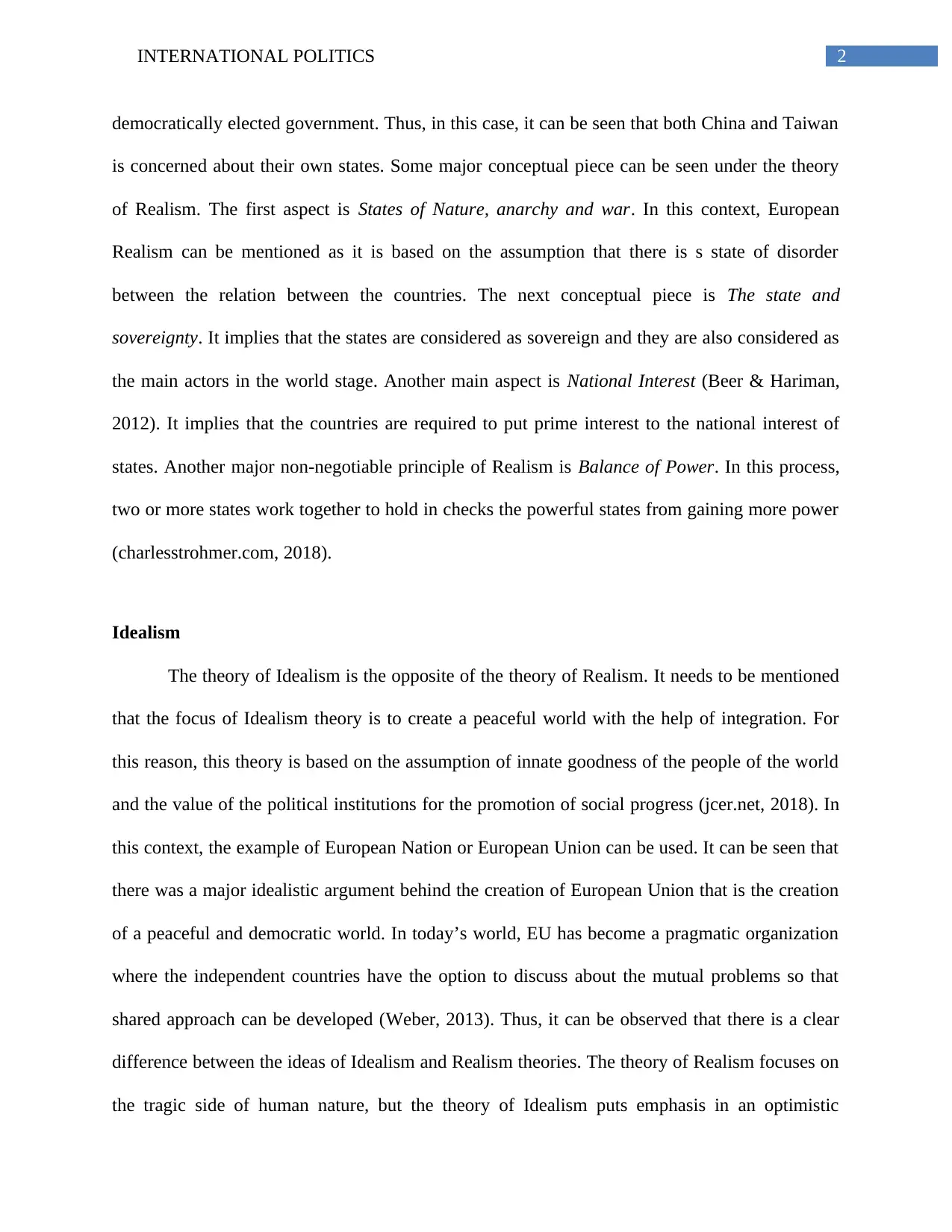
2INTERNATIONAL POLITICS
democratically elected government. Thus, in this case, it can be seen that both China and Taiwan
is concerned about their own states. Some major conceptual piece can be seen under the theory
of Realism. The first aspect is States of Nature, anarchy and war. In this context, European
Realism can be mentioned as it is based on the assumption that there is s state of disorder
between the relation between the countries. The next conceptual piece is The state and
sovereignty. It implies that the states are considered as sovereign and they are also considered as
the main actors in the world stage. Another main aspect is National Interest (Beer & Hariman,
2012). It implies that the countries are required to put prime interest to the national interest of
states. Another major non-negotiable principle of Realism is Balance of Power. In this process,
two or more states work together to hold in checks the powerful states from gaining more power
(charlesstrohmer.com, 2018).
Idealism
The theory of Idealism is the opposite of the theory of Realism. It needs to be mentioned
that the focus of Idealism theory is to create a peaceful world with the help of integration. For
this reason, this theory is based on the assumption of innate goodness of the people of the world
and the value of the political institutions for the promotion of social progress (jcer.net, 2018). In
this context, the example of European Nation or European Union can be used. It can be seen that
there was a major idealistic argument behind the creation of European Union that is the creation
of a peaceful and democratic world. In today’s world, EU has become a pragmatic organization
where the independent countries have the option to discuss about the mutual problems so that
shared approach can be developed (Weber, 2013). Thus, it can be observed that there is a clear
difference between the ideas of Idealism and Realism theories. The theory of Realism focuses on
the tragic side of human nature, but the theory of Idealism puts emphasis in an optimistic
democratically elected government. Thus, in this case, it can be seen that both China and Taiwan
is concerned about their own states. Some major conceptual piece can be seen under the theory
of Realism. The first aspect is States of Nature, anarchy and war. In this context, European
Realism can be mentioned as it is based on the assumption that there is s state of disorder
between the relation between the countries. The next conceptual piece is The state and
sovereignty. It implies that the states are considered as sovereign and they are also considered as
the main actors in the world stage. Another main aspect is National Interest (Beer & Hariman,
2012). It implies that the countries are required to put prime interest to the national interest of
states. Another major non-negotiable principle of Realism is Balance of Power. In this process,
two or more states work together to hold in checks the powerful states from gaining more power
(charlesstrohmer.com, 2018).
Idealism
The theory of Idealism is the opposite of the theory of Realism. It needs to be mentioned
that the focus of Idealism theory is to create a peaceful world with the help of integration. For
this reason, this theory is based on the assumption of innate goodness of the people of the world
and the value of the political institutions for the promotion of social progress (jcer.net, 2018). In
this context, the example of European Nation or European Union can be used. It can be seen that
there was a major idealistic argument behind the creation of European Union that is the creation
of a peaceful and democratic world. In today’s world, EU has become a pragmatic organization
where the independent countries have the option to discuss about the mutual problems so that
shared approach can be developed (Weber, 2013). Thus, it can be observed that there is a clear
difference between the ideas of Idealism and Realism theories. The theory of Realism focuses on
the tragic side of human nature, but the theory of Idealism puts emphasis in an optimistic
⊘ This is a preview!⊘
Do you want full access?
Subscribe today to unlock all pages.

Trusted by 1+ million students worldwide
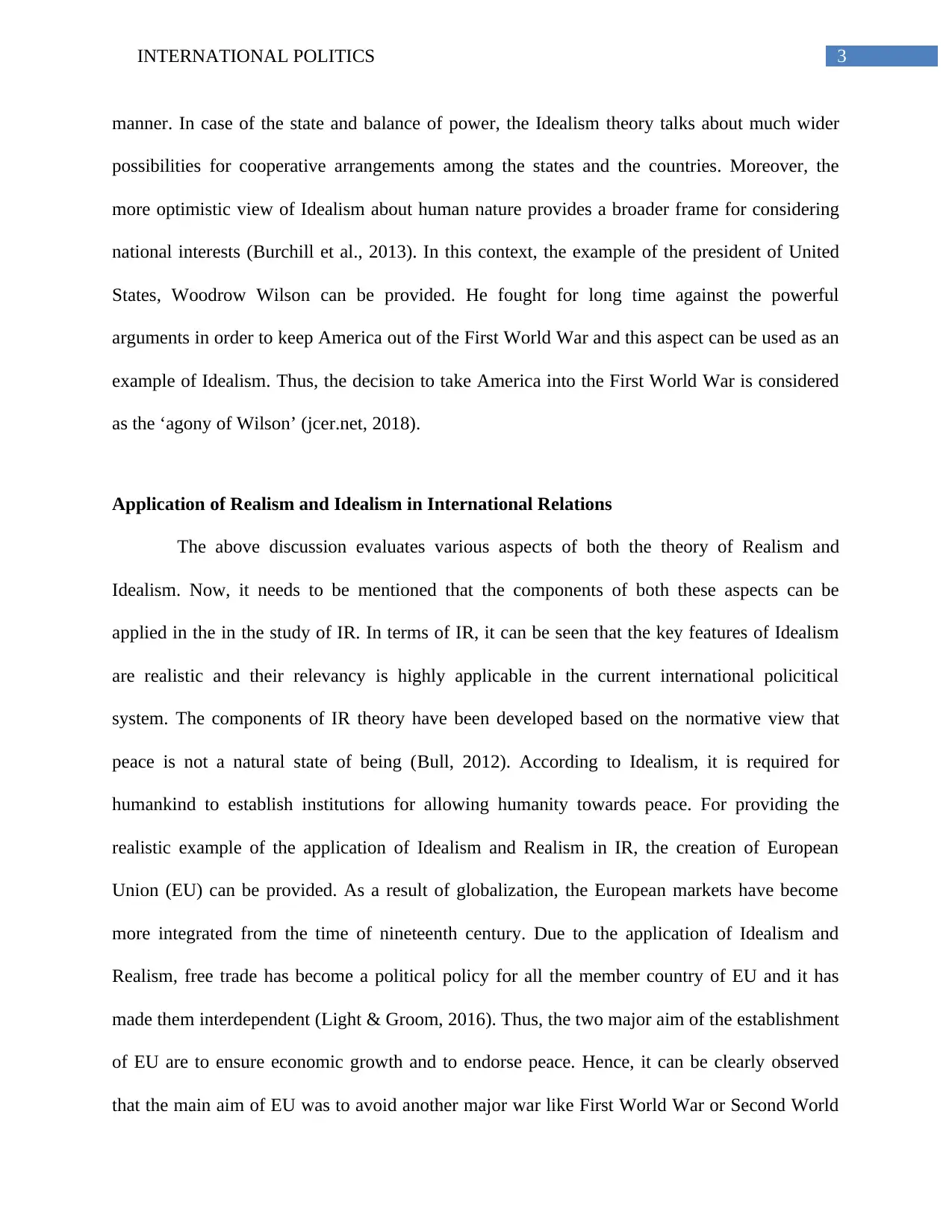
3INTERNATIONAL POLITICS
manner. In case of the state and balance of power, the Idealism theory talks about much wider
possibilities for cooperative arrangements among the states and the countries. Moreover, the
more optimistic view of Idealism about human nature provides a broader frame for considering
national interests (Burchill et al., 2013). In this context, the example of the president of United
States, Woodrow Wilson can be provided. He fought for long time against the powerful
arguments in order to keep America out of the First World War and this aspect can be used as an
example of Idealism. Thus, the decision to take America into the First World War is considered
as the ‘agony of Wilson’ (jcer.net, 2018).
Application of Realism and Idealism in International Relations
The above discussion evaluates various aspects of both the theory of Realism and
Idealism. Now, it needs to be mentioned that the components of both these aspects can be
applied in the in the study of IR. In terms of IR, it can be seen that the key features of Idealism
are realistic and their relevancy is highly applicable in the current international policitical
system. The components of IR theory have been developed based on the normative view that
peace is not a natural state of being (Bull, 2012). According to Idealism, it is required for
humankind to establish institutions for allowing humanity towards peace. For providing the
realistic example of the application of Idealism and Realism in IR, the creation of European
Union (EU) can be provided. As a result of globalization, the European markets have become
more integrated from the time of nineteenth century. Due to the application of Idealism and
Realism, free trade has become a political policy for all the member country of EU and it has
made them interdependent (Light & Groom, 2016). Thus, the two major aim of the establishment
of EU are to ensure economic growth and to endorse peace. Hence, it can be clearly observed
that the main aim of EU was to avoid another major war like First World War or Second World
manner. In case of the state and balance of power, the Idealism theory talks about much wider
possibilities for cooperative arrangements among the states and the countries. Moreover, the
more optimistic view of Idealism about human nature provides a broader frame for considering
national interests (Burchill et al., 2013). In this context, the example of the president of United
States, Woodrow Wilson can be provided. He fought for long time against the powerful
arguments in order to keep America out of the First World War and this aspect can be used as an
example of Idealism. Thus, the decision to take America into the First World War is considered
as the ‘agony of Wilson’ (jcer.net, 2018).
Application of Realism and Idealism in International Relations
The above discussion evaluates various aspects of both the theory of Realism and
Idealism. Now, it needs to be mentioned that the components of both these aspects can be
applied in the in the study of IR. In terms of IR, it can be seen that the key features of Idealism
are realistic and their relevancy is highly applicable in the current international policitical
system. The components of IR theory have been developed based on the normative view that
peace is not a natural state of being (Bull, 2012). According to Idealism, it is required for
humankind to establish institutions for allowing humanity towards peace. For providing the
realistic example of the application of Idealism and Realism in IR, the creation of European
Union (EU) can be provided. As a result of globalization, the European markets have become
more integrated from the time of nineteenth century. Due to the application of Idealism and
Realism, free trade has become a political policy for all the member country of EU and it has
made them interdependent (Light & Groom, 2016). Thus, the two major aim of the establishment
of EU are to ensure economic growth and to endorse peace. Hence, it can be clearly observed
that the main aim of EU was to avoid another major war like First World War or Second World
Paraphrase This Document
Need a fresh take? Get an instant paraphrase of this document with our AI Paraphraser
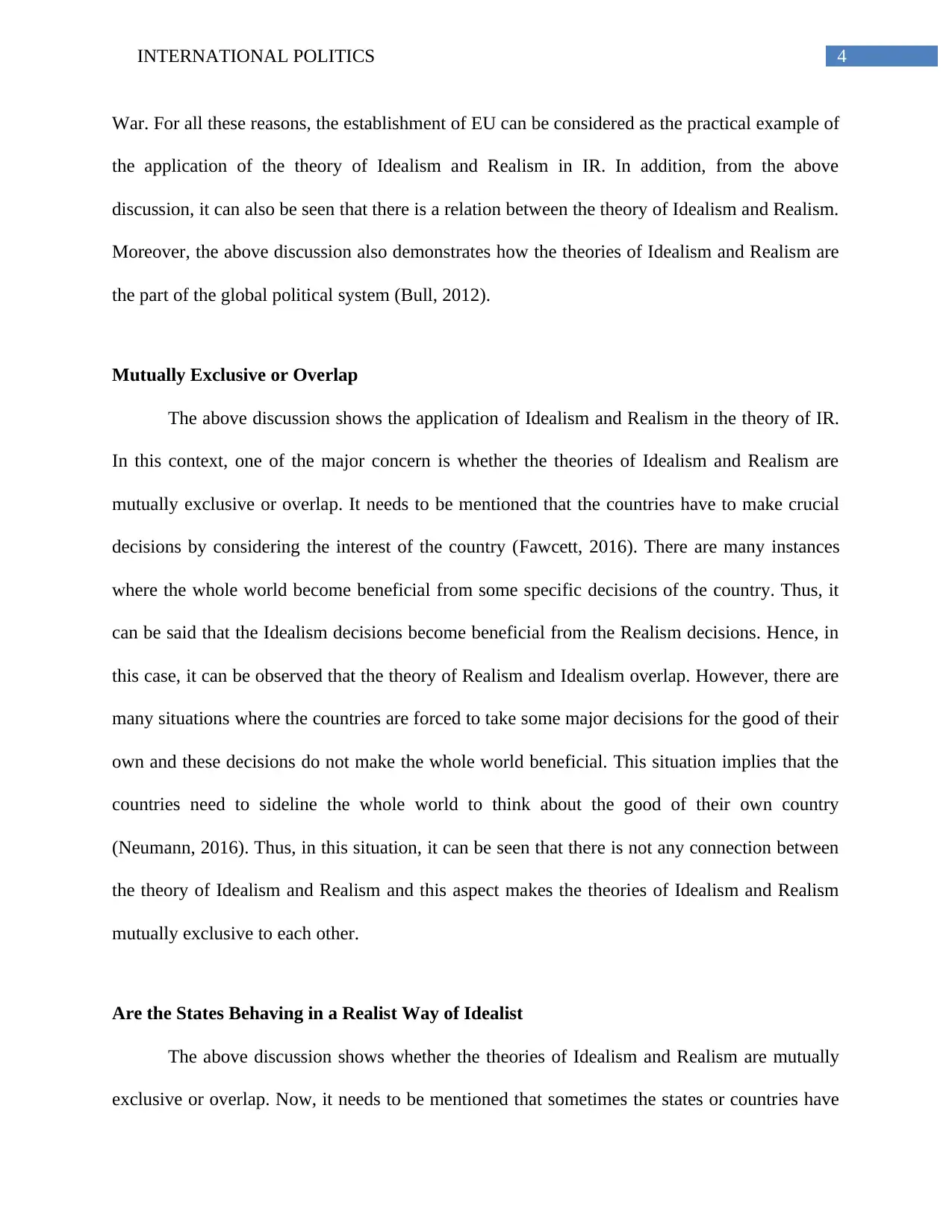
4INTERNATIONAL POLITICS
War. For all these reasons, the establishment of EU can be considered as the practical example of
the application of the theory of Idealism and Realism in IR. In addition, from the above
discussion, it can also be seen that there is a relation between the theory of Idealism and Realism.
Moreover, the above discussion also demonstrates how the theories of Idealism and Realism are
the part of the global political system (Bull, 2012).
Mutually Exclusive or Overlap
The above discussion shows the application of Idealism and Realism in the theory of IR.
In this context, one of the major concern is whether the theories of Idealism and Realism are
mutually exclusive or overlap. It needs to be mentioned that the countries have to make crucial
decisions by considering the interest of the country (Fawcett, 2016). There are many instances
where the whole world become beneficial from some specific decisions of the country. Thus, it
can be said that the Idealism decisions become beneficial from the Realism decisions. Hence, in
this case, it can be observed that the theory of Realism and Idealism overlap. However, there are
many situations where the countries are forced to take some major decisions for the good of their
own and these decisions do not make the whole world beneficial. This situation implies that the
countries need to sideline the whole world to think about the good of their own country
(Neumann, 2016). Thus, in this situation, it can be seen that there is not any connection between
the theory of Idealism and Realism and this aspect makes the theories of Idealism and Realism
mutually exclusive to each other.
Are the States Behaving in a Realist Way of Idealist
The above discussion shows whether the theories of Idealism and Realism are mutually
exclusive or overlap. Now, it needs to be mentioned that sometimes the states or countries have
War. For all these reasons, the establishment of EU can be considered as the practical example of
the application of the theory of Idealism and Realism in IR. In addition, from the above
discussion, it can also be seen that there is a relation between the theory of Idealism and Realism.
Moreover, the above discussion also demonstrates how the theories of Idealism and Realism are
the part of the global political system (Bull, 2012).
Mutually Exclusive or Overlap
The above discussion shows the application of Idealism and Realism in the theory of IR.
In this context, one of the major concern is whether the theories of Idealism and Realism are
mutually exclusive or overlap. It needs to be mentioned that the countries have to make crucial
decisions by considering the interest of the country (Fawcett, 2016). There are many instances
where the whole world become beneficial from some specific decisions of the country. Thus, it
can be said that the Idealism decisions become beneficial from the Realism decisions. Hence, in
this case, it can be observed that the theory of Realism and Idealism overlap. However, there are
many situations where the countries are forced to take some major decisions for the good of their
own and these decisions do not make the whole world beneficial. This situation implies that the
countries need to sideline the whole world to think about the good of their own country
(Neumann, 2016). Thus, in this situation, it can be seen that there is not any connection between
the theory of Idealism and Realism and this aspect makes the theories of Idealism and Realism
mutually exclusive to each other.
Are the States Behaving in a Realist Way of Idealist
The above discussion shows whether the theories of Idealism and Realism are mutually
exclusive or overlap. Now, it needs to be mentioned that sometimes the states or countries have
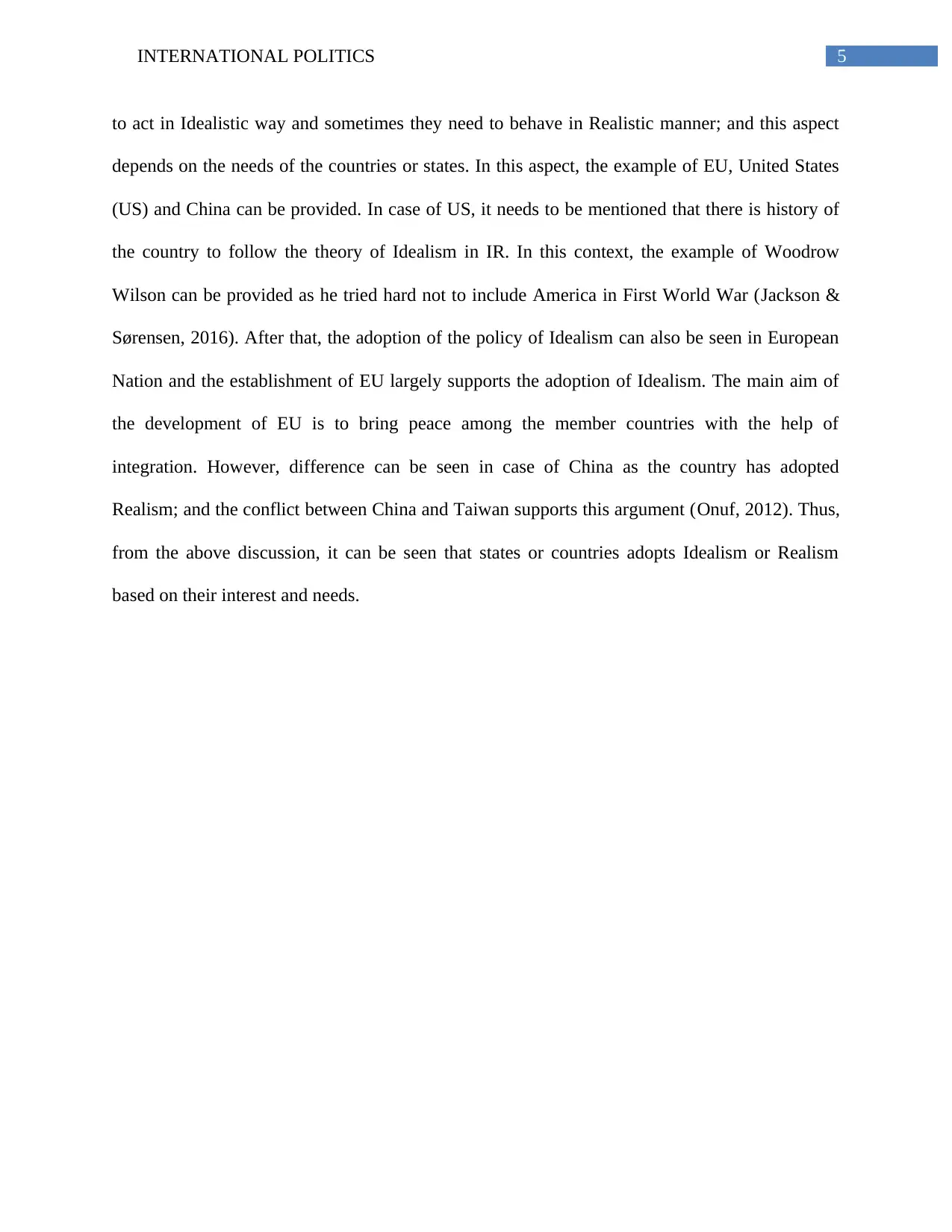
5INTERNATIONAL POLITICS
to act in Idealistic way and sometimes they need to behave in Realistic manner; and this aspect
depends on the needs of the countries or states. In this aspect, the example of EU, United States
(US) and China can be provided. In case of US, it needs to be mentioned that there is history of
the country to follow the theory of Idealism in IR. In this context, the example of Woodrow
Wilson can be provided as he tried hard not to include America in First World War (Jackson &
Sørensen, 2016). After that, the adoption of the policy of Idealism can also be seen in European
Nation and the establishment of EU largely supports the adoption of Idealism. The main aim of
the development of EU is to bring peace among the member countries with the help of
integration. However, difference can be seen in case of China as the country has adopted
Realism; and the conflict between China and Taiwan supports this argument (Onuf, 2012). Thus,
from the above discussion, it can be seen that states or countries adopts Idealism or Realism
based on their interest and needs.
to act in Idealistic way and sometimes they need to behave in Realistic manner; and this aspect
depends on the needs of the countries or states. In this aspect, the example of EU, United States
(US) and China can be provided. In case of US, it needs to be mentioned that there is history of
the country to follow the theory of Idealism in IR. In this context, the example of Woodrow
Wilson can be provided as he tried hard not to include America in First World War (Jackson &
Sørensen, 2016). After that, the adoption of the policy of Idealism can also be seen in European
Nation and the establishment of EU largely supports the adoption of Idealism. The main aim of
the development of EU is to bring peace among the member countries with the help of
integration. However, difference can be seen in case of China as the country has adopted
Realism; and the conflict between China and Taiwan supports this argument (Onuf, 2012). Thus,
from the above discussion, it can be seen that states or countries adopts Idealism or Realism
based on their interest and needs.
⊘ This is a preview!⊘
Do you want full access?
Subscribe today to unlock all pages.

Trusted by 1+ million students worldwide
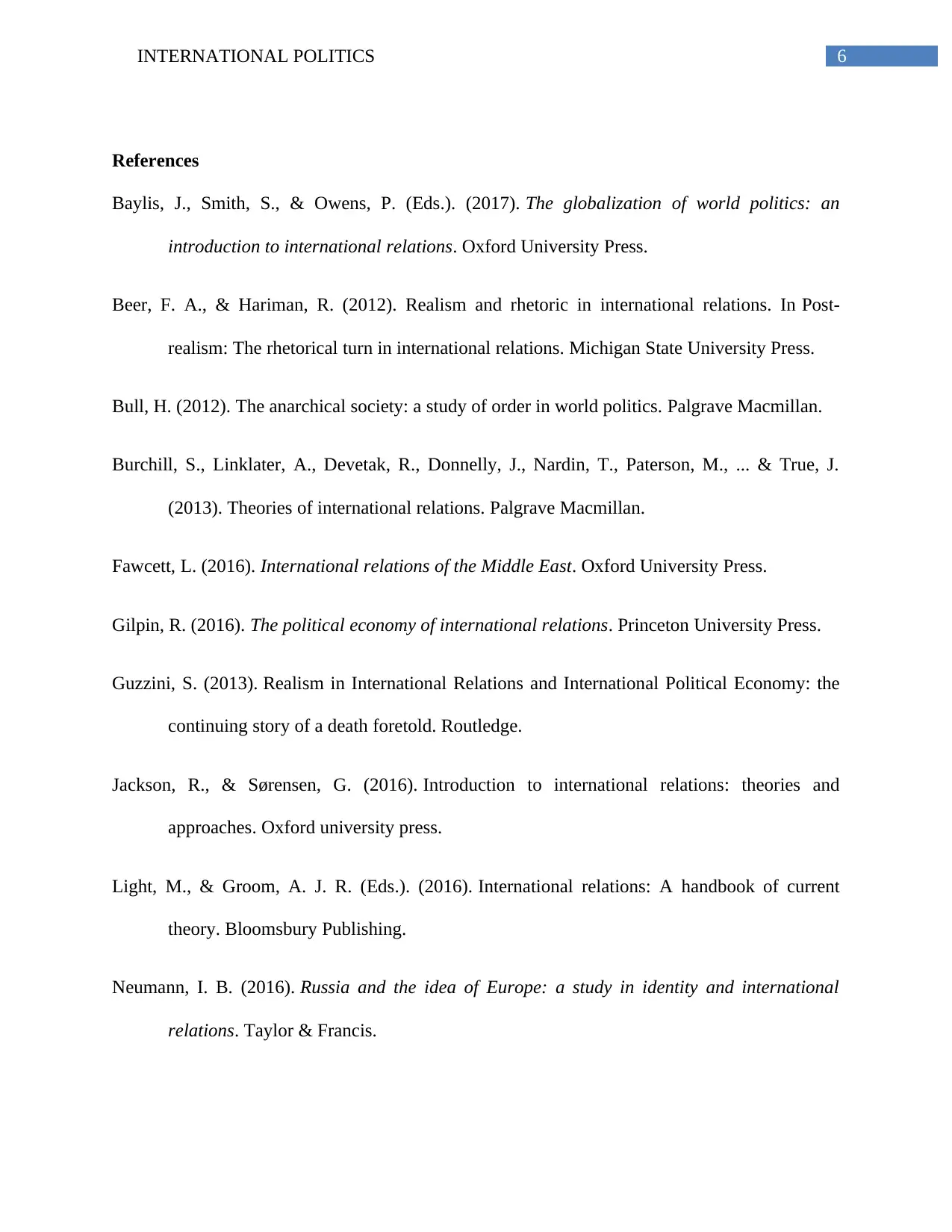
6INTERNATIONAL POLITICS
References
Baylis, J., Smith, S., & Owens, P. (Eds.). (2017). The globalization of world politics: an
introduction to international relations. Oxford University Press.
Beer, F. A., & Hariman, R. (2012). Realism and rhetoric in international relations. In Post-
realism: The rhetorical turn in international relations. Michigan State University Press.
Bull, H. (2012). The anarchical society: a study of order in world politics. Palgrave Macmillan.
Burchill, S., Linklater, A., Devetak, R., Donnelly, J., Nardin, T., Paterson, M., ... & True, J.
(2013). Theories of international relations. Palgrave Macmillan.
Fawcett, L. (2016). International relations of the Middle East. Oxford University Press.
Gilpin, R. (2016). The political economy of international relations. Princeton University Press.
Guzzini, S. (2013). Realism in International Relations and International Political Economy: the
continuing story of a death foretold. Routledge.
Jackson, R., & Sørensen, G. (2016). Introduction to international relations: theories and
approaches. Oxford university press.
Light, M., & Groom, A. J. R. (Eds.). (2016). International relations: A handbook of current
theory. Bloomsbury Publishing.
Neumann, I. B. (2016). Russia and the idea of Europe: a study in identity and international
relations. Taylor & Francis.
References
Baylis, J., Smith, S., & Owens, P. (Eds.). (2017). The globalization of world politics: an
introduction to international relations. Oxford University Press.
Beer, F. A., & Hariman, R. (2012). Realism and rhetoric in international relations. In Post-
realism: The rhetorical turn in international relations. Michigan State University Press.
Bull, H. (2012). The anarchical society: a study of order in world politics. Palgrave Macmillan.
Burchill, S., Linklater, A., Devetak, R., Donnelly, J., Nardin, T., Paterson, M., ... & True, J.
(2013). Theories of international relations. Palgrave Macmillan.
Fawcett, L. (2016). International relations of the Middle East. Oxford University Press.
Gilpin, R. (2016). The political economy of international relations. Princeton University Press.
Guzzini, S. (2013). Realism in International Relations and International Political Economy: the
continuing story of a death foretold. Routledge.
Jackson, R., & Sørensen, G. (2016). Introduction to international relations: theories and
approaches. Oxford university press.
Light, M., & Groom, A. J. R. (Eds.). (2016). International relations: A handbook of current
theory. Bloomsbury Publishing.
Neumann, I. B. (2016). Russia and the idea of Europe: a study in identity and international
relations. Taylor & Francis.
Paraphrase This Document
Need a fresh take? Get an instant paraphrase of this document with our AI Paraphraser
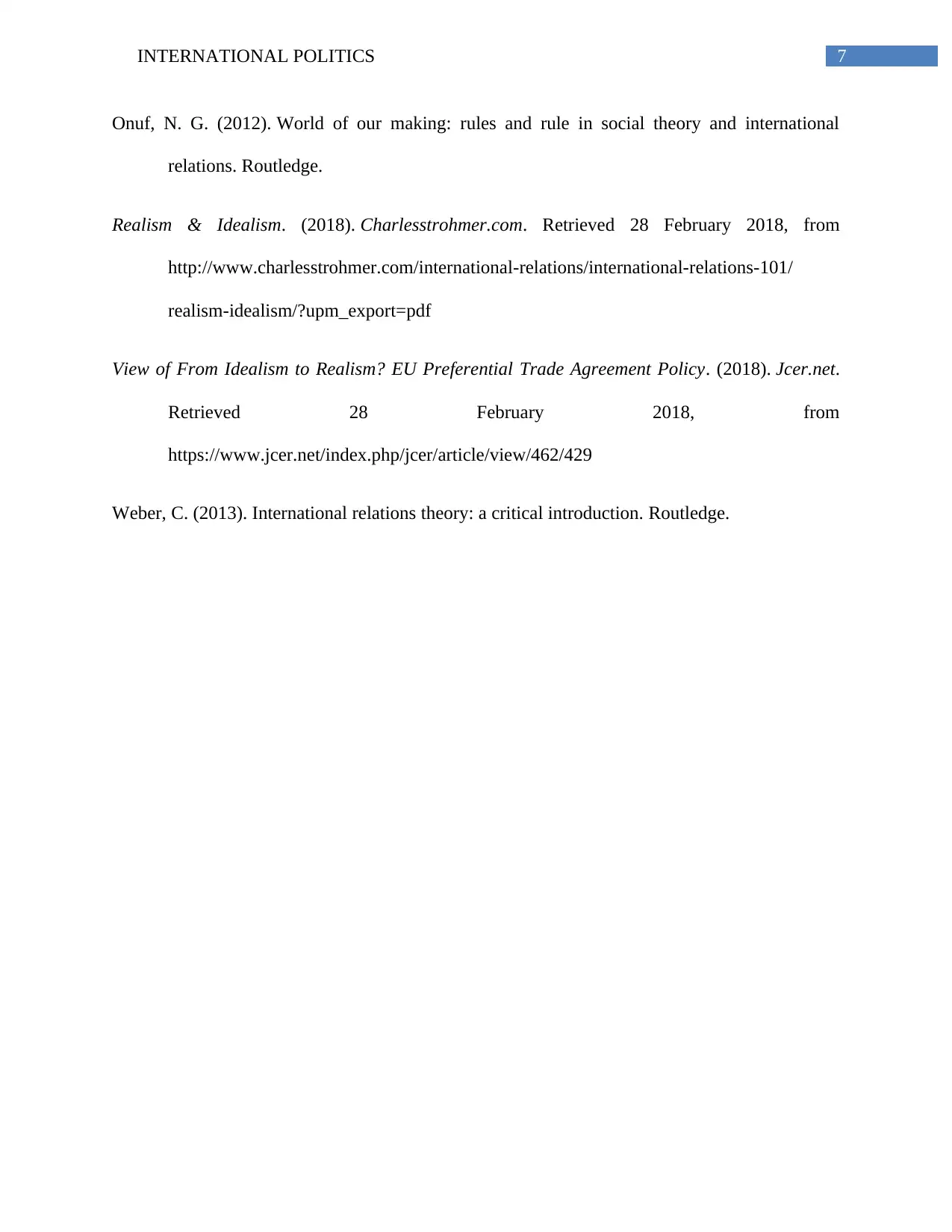
7INTERNATIONAL POLITICS
Onuf, N. G. (2012). World of our making: rules and rule in social theory and international
relations. Routledge.
Realism & Idealism. (2018). Charlesstrohmer.com. Retrieved 28 February 2018, from
http://www.charlesstrohmer.com/international-relations/international-relations-101/
realism-idealism/?upm_export=pdf
View of From Idealism to Realism? EU Preferential Trade Agreement Policy. (2018). Jcer.net.
Retrieved 28 February 2018, from
https://www.jcer.net/index.php/jcer/article/view/462/429
Weber, C. (2013). International relations theory: a critical introduction. Routledge.
Onuf, N. G. (2012). World of our making: rules and rule in social theory and international
relations. Routledge.
Realism & Idealism. (2018). Charlesstrohmer.com. Retrieved 28 February 2018, from
http://www.charlesstrohmer.com/international-relations/international-relations-101/
realism-idealism/?upm_export=pdf
View of From Idealism to Realism? EU Preferential Trade Agreement Policy. (2018). Jcer.net.
Retrieved 28 February 2018, from
https://www.jcer.net/index.php/jcer/article/view/462/429
Weber, C. (2013). International relations theory: a critical introduction. Routledge.
1 out of 8
Related Documents
Your All-in-One AI-Powered Toolkit for Academic Success.
+13062052269
info@desklib.com
Available 24*7 on WhatsApp / Email
![[object Object]](/_next/static/media/star-bottom.7253800d.svg)
Unlock your academic potential
Copyright © 2020–2026 A2Z Services. All Rights Reserved. Developed and managed by ZUCOL.





